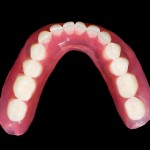
Implant supported dentures have a significantly higher cost than traditional complete dentures although consensus conferences have suggested that mandibular dentures supported by two implants should be seen as a minimum standard. A small number of studies have suggested that overdentures supported by a single implant may be an effective cheaper alternative.
The main aim of this study was to test whether there was any difference in patient’s satisfaction after 5 years between the 1-implant and 2-implant mandibular overdentures
Methods
Health edentulous patients with at least 10mm of bone height in the anterior mandible were recruited. They were stratified by sex and ridge resorption and randomised in block to receive either 1 (group 1) or 2 implants ( group 2) and implant overdenture. Standard recommendations were given on denture and oral hygiene and on not wearing the dentures at night. Patients were assessed prior to implant placement (baseline) at 2 months, 1, 3 and 5 yrs. Satisfaction with treatment and monitoring of the implants, peri-implant tissues, dentures, and attachments was undertaken.
Results
- 86 patients were randomised 42 to group 1, 44 to group 2.
- After 5 years, there were 29 (69%) patients in group 1 and 33 (75%) in group 2.
- Of those lost to follow up the majority (14) died (8 in group 1; 6 in group 2).
- All implants in group 1 and 94.3% in group 2 survived.
- There was no significant difference in satisfaction scores between the groups
- There were no statistically significant associations between the number of maintenance events and treatment groups. Group 1 experienced almost twice as many fractured dentures usually adjacent to the implant attachment.
Conclusions
The authors concluded
There was no statistical difference after 5 y in overall satisfaction or survival of implants with mandibular overdentures retained by 1 or 2 implants. However the 1-implant group had a tendency for more prosthetic maintenance with more fractured dentures. The decreased power of the analysis due to 28% of dropouts suggests that further research is needed to determine the effectiveness of the single implant beyond 5 y and to reduce the tendency for implant dentures to fracture.
Commentary
The loss of patients within this study could have resulted in attrition bias and although the authors suggest that there is no apparent biases as a result. While there are no statistically significant differences between the two groups there were more denture fractures in group 1 . While professional consensus does recommend that 2 implants should be a minimum standard for mandibular implants this trial does suggest that a one implant approach may be worth investigating. Previously we reported on a review of single implant overdentures Srinivasan et al (Dental Elf 9th Dec 2014) that included 30 studies, only 2 of which were RCTs. This study was one of those RCTs, and overall the review suggested that this approach may be possible, although more high quality, longer-terms studies are needed to improve the evidence-base.
Links
Bryant SR, Walton JN, MacEntee MI. A 5-year randomized trial to compare 1 or 2 implants for implant overdentures. J Dent Res. 2015 Jan;94(1):36-43. doi: 10.1177/0022034514554224. Epub 2014 Oct 27. PubMed PMID: 25348544.

Prescribing antipsychotics in primary care: new study highlights frequent off-label use http://t.co/ddkEX2yUsR
Don’t miss – Overdentures: no difference between 1 or 2 implants supporting a mandibular overdenture http://t.co/qahSZEKip3